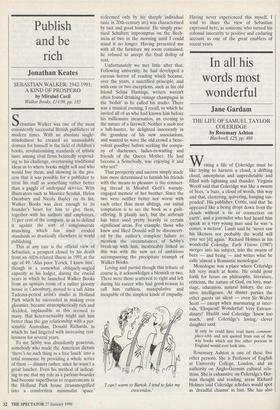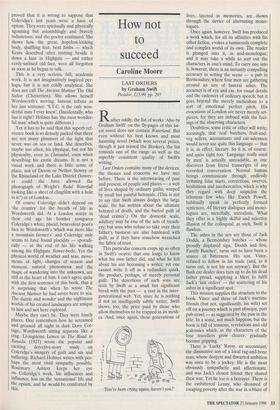In all his words most wonderful
Jane Gardam
THE LIFE OF SAMUEL TAYLOR COLERIDGE by Rosemary Ashton Blackwell, £25, pp. 480 Writing a life of Coleridge must be like trying to harness a cloud, a drifting cloud, amorphous and unpredictable and filled with lightning and thunder. Virginia Woolf said that Coleridge was like a swarm of bees, 'a buzz, a cloud of words, this way and that, clustering, quivering, hanging sus- pended'. His publisher, Cottle, said that 'he appeared like a being dropt down from the clouds without a tie or connection on earth', and a journalist who had heard him speak as a very young man said he was 'a comet, a meteor'. Lamb said he 'never saw his likeness nor probably the world will ever see [it] again.' Richard Holmes in his wonderful Coleridge, Early Visions (1987) merges into his subject, into the swarm of bees — and being — and writes what he calls 'almost a Romantic monologue'.
Monologue was a place where Coleridge felt very much at home. He could pour forth for hours on philosophy, literature, criticism, the nature of God, on love, mar- riage, education, natural history, the cre- ative intelligence. At dinner parties the other guests sat silent — even Sir Walter Scott — except when murmuring at inter- vals, 'Eloquent! Wonderful! Very Extraor- dinary!' Hazlitt said Coleridge 'knew too much,' and Coleridge's loving, clever daughter said: If only he could have read more common- place-ishly and not quoted from out of the way books which not five other persons in England would ever look into.
Rosemary Ashton is one of these five other persons. She is Professor of English at University College, London, and an authority on Anglo-German cultural rela- tions. She is exhaustive on Coleridge's Ger- man thought and reading, areas Richard Holmes said Coleridge scholars would spot as 'dreadful chasms' in him. She has also proved that it is wrong to suppose that Coleridge's last years were a haze of opium. They were spiritually and physically agonising but astonishingly and bravely industrious; and the poetry continued. She shows how the great, hopeless-looking body, shuffling feet, bent limbs — which Keats described after trotting beside it down a lane in Highgate — and rather eerily-unlined old face, were all forgotten as soon as he began to talk.
This is a very serious, full, academic work. It is not imaginatively inspired per- haps, but it is not coldly analytical. She does not call The Ancient Mariner The Old Sailor (Chesterton). She allows herself Wordsworth's moving, famous tribute as her last sentence: `S.T.C. is the only won- derful man I ever knew'. (Incidentally, who has it right? Holmes has 'the most wonder- ful man' which is quite different.) Yet it has to be said that this superb ref- erence book is so densely packed that there are not many glimmers of the light that never was on sea or land. She describes, maybe too often, his physique, but not his physicality, even in Christabel, even when describing his erotic dreams. It is not a visual work and there is little sense of place, not of Devon or Nether Stowey or the Rhineland or the Lake District (howev- er could she have allowed the photograph of Wright's Rydal Waterfall looking like a sheet of clingfilm with a hole in it?) or of London.
Of course Coleridge didn't depend on `the country' for the breath of life as Wordsworth did. At a London soirée in their old age his brother compares Coleridge's white, placid, benevolent poet's face to Wordsworth's 'which was more like a mountain farmer's' and Coleridge only seems to have found placidity — sporadi- cally — at the end of his life walking among his Highgate flower-beds. Yet the physical world of weather and seas, move- ments of light, changes of season and moment, natural phenomena and the magic of wandering into the unknown, are still at the heart of him. I can't agree quite with the first sentence of this book, that it is surprising that when he wrote The Ancient Mariner he had never been to sea. The dazzle and wonder and the nightmare worlds of his created landscapes are unique to him and not here explored.
Maybe they can't be. They were lonely places. One remembers how he screamed and groaned all night in dark Dove Cot- tage, Wordsworth sitting separate like a crag. Livingstone Lowes in The Road to Xanadu (1927) wrote the popular and exciting detective-story study on Coleridge's imagery of guilt and sin and suffering. Richard Holmes writes with per- haps the most vivid sympathy possible. Rosemary Ashton keeps her eye on Coleridge's work, his influences and influence, less on the 'sensational' life and the opium, and he would be comforted by this.



























































 Previous page
Previous page